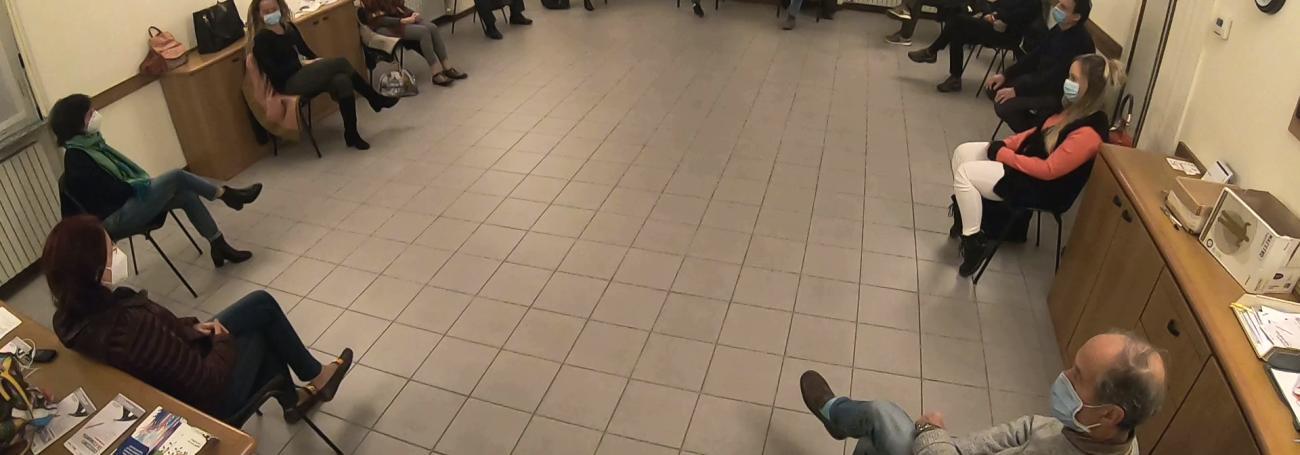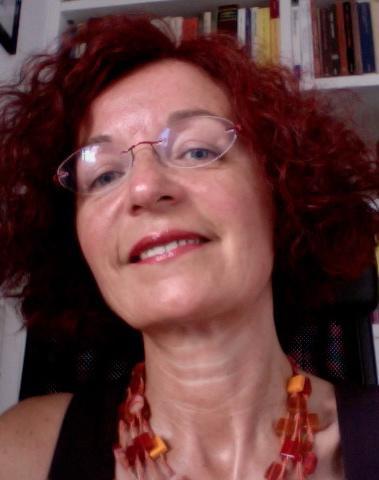
Heidi Jokinen interviews with Bruna Dighera, a psychologist and a psychotherapist in Italy, who has used restorative methods to deal with conflicts emerging around Covid-19 vaccines.

Heidi Jokinen interviews with Bruna Dighera, a psychologist and a psychotherapist in Italy, who has used restorative methods to deal with conflicts emerging around Covid-19 vaccines.

Bruna, you introduced restorative circles in Covid’s time to deal with anti-vaccination initiatives. Can you tell us a bit more about what was your approach?
Just after the first lock-down in Italy, between June and October 2020, l’Innominato, Tavolo lecchese per la Giustizia Restorativa had proposed the RestoCovid Circles, to help the community share the trauma of the pandemic that, particularly in Lombardy (the region where the city of Lecco is located), had hit hard with more than 10000 deaths in a few months.
The RestoCovid Circles experience had been very positive for the well-being of the participants. They were able to express emotions emerging from those experiences, including fear and anger, which were expressed strongly.
In 2021, the ever-increasing pressure exerted by the Italian government and the Scientific Technical Committee towards vaccination created divisions and even oppositions between the vaccinated people who wanted vaccination to be extended to all and those who wanted the option not to vaccinate.
The increasingly stringent introduction of the Green Pass, the important limitations that were imposed on those who did not have the certification and the pervasive public communication on this issue had generated a hardening of personal and collective positions up to a polarisation that, from the end of the year 2021 to the early months of 2022, had created widespread tension and conflict between people, families, relationships between friends, colleagues in the workplace, social networks that for decades worked together in the territories, organisations and so on.
In addition to breaks in relationships and the breaking of ties, there were episodes of discrimination, verbal aggression, acts of violence and a general tightening of social and interpersonal relations. Even just ‘talking’ about the issue seemed to become impossible; in the best of situations, communication was disrupted and many people found themselves living excluded from the rest of society and deprived of the possibility of going to work.
What do you think restorative justice has to do with anti-vaccine attitudes?
We think that the restorative community approach and practices can be valuable resources where conflicts and tensions are generated in social coexistence, where links are broken between people and in social, family, friendship and work networks, where communication is interrupted, where intolerance, discrimination and mistreatment are reinforced, leading to damage and suffering, and even to the commission of crimes.
The first RestoCovid Circles between vaccinated and unvaccinated people was carried out in early February 2022. The unvaccinated, and to some extent vaccinated, people we have met so far have not focused on the issue of the vaccine itself, but rather on the denied freedom of choice and the severe consequences they have suffered in their personal lives.
The unvaccinated, and to some extent also the vaccinated, expressed strong feelings of injustice, resentment towards others and a deep distrust of institutions. We don’t think that restorative justice can be left out of this.
When did you first become aware of restorative justice and what originally interested you?
I first came across restorative justice in the second half of the 1980s, when I was studying psychology at the University La Sapienza of Rome with Prof Gaetano De Leo.
De Leo is a criminologist who dealt with juvenile justice and who participated in the drafting of an important norm on Juvenile Criminal Process which was issued in Italy in 1988. For the first time in our country, the idea of reparation as a possibility ‘other’ than penal retribution and social and therapeutic rehabilitation had been introduced in a law, in the juvenile penal process.
In 1991, still on the suggestion of Prof De Leo, I participated in an international seminar on restorative justice, organised in Tuscany, which stimulated me a lot in the deepening of the topic.
Working as a psychologist in the justice system and also as a psychotherapist in the public health system, I have been meeting for thirty years people who engage in deviant and criminal behaviour and also people who suffer damage from criminal actions.
I think that the answers of the traditional justice system, although unconquerable, have given ample proof that they fail to achieve their objectives in general and special prevention. Also therapeutic and clinical responses, although useful in many cases, are not comprehensive with respect to the needs of victims and offenders.
I believe that a community oriented towards restorative values and practices would have much less need for criminal justice (and even specialist care) that fails to address many of the needs of victims, fails to make the community safe, responsible and involved, and fails neither to prevent criminal acts, nor to successfully re-include the people who committed those acts.
Could you give us a little taste of your main message for the conference participants or perhaps a challenge you would like them to take away?
It is difficult to answer this question today. The RestoCovid Circles on this issue have only just started and it is a new experience and not easy to understand. It was difficult to even find a place that would take in both vaccinated and unvaccinated people and therefore without certification.
What we can try to tell you is the road we are trying to take together, bearing in mind that the war in Ukraine has made Covid-19 issues partly obsolete in public communication. But perhaps not in people's lives.
What is emerging from the RestoCovid Circles is a strong feeling of injustice, of disrespect for personal freedom and of resentment and distrust towards institutions and between people. There is a need for encounter and facilitated dialogue. There is a need to rebuild trust between people and towards institutions (including the scientific community). There is a need to redraw the balance between the I and the We. Can restorative justice help?
Bruna Dighera
was interviewed by
Heidi Jokinen, who is a Post-doctoral researcher at Åbo Akademi University, Finland
contact: heidi.jokinen@abo.fi
Published on 7 June 2022.